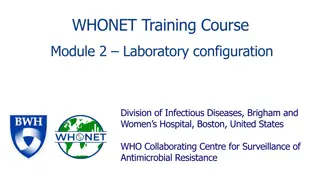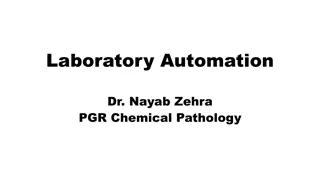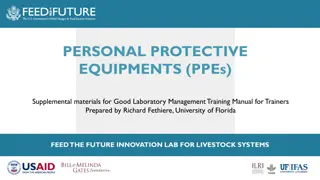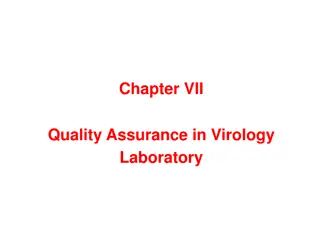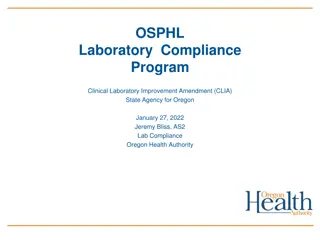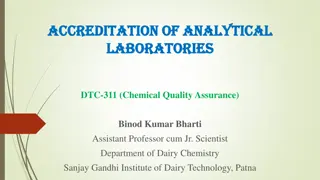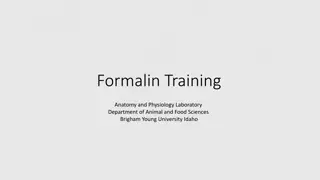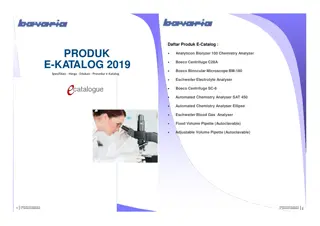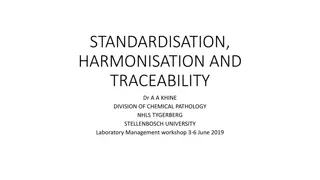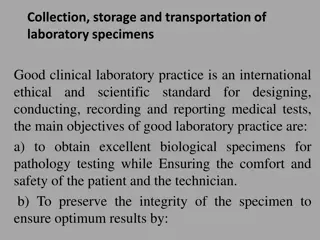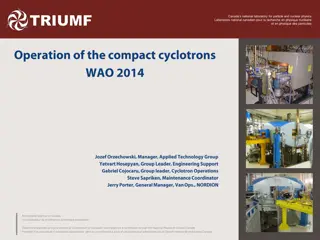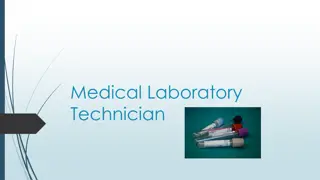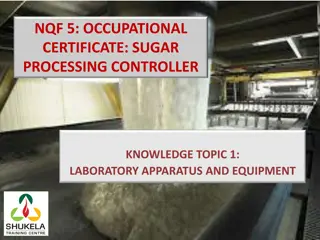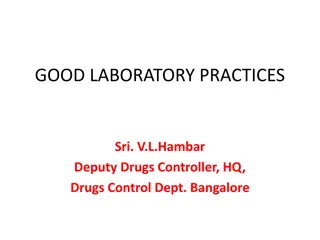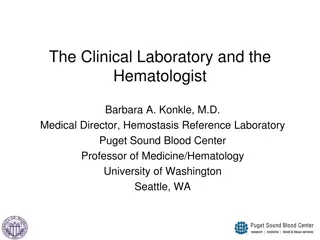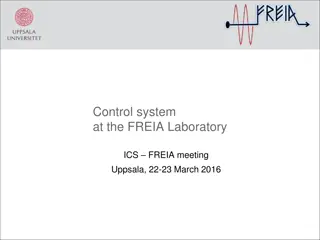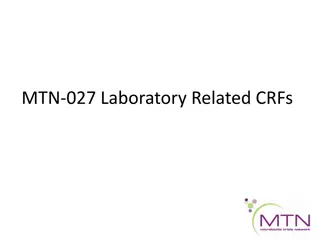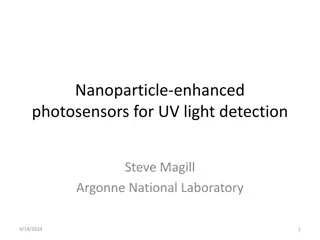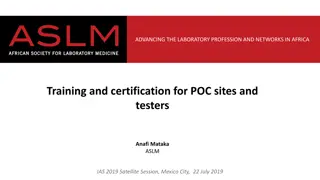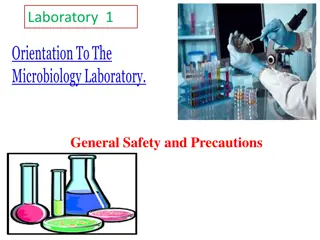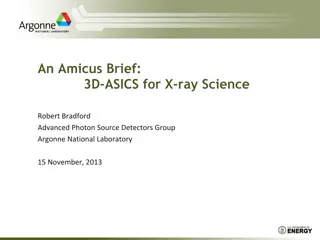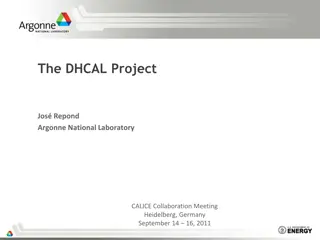History and Educational Programs of DEU Lab Animal Science Department
Established in 2004, the Department of Laboratory Animal Science at Dokuz Eylul University Institute of Health Sciences offers cutting-edge education focusing on animal welfare and ethical practices in scientific research. The department upholds the 3R Principle—Reduction, Refinement, Replacement�
0 views • 9 slides
Laboratory Material Quality Management Procedures
This detailed guide covers the comprehensive process management and quality control procedures for laboratory materials, including the life cycle of materials, purchase processes, vendor evaluation, reception and storage guidelines, and evaluation criteria. It emphasizes the importance of documented
1 views • 20 slides
Effective Laboratory Management: Safety, Equipment Maintenance, and Inventory Control
This comprehensive training manual covers essential topics such as laboratory safety, equipment maintenance, supplies and reagents inventory, chemical inventory management, and material safety data sheets. It emphasizes the importance of proper procedures to ensure a safe working environment and eff
1 views • 19 slides
Optimizing Laboratory Billing Services, The Key to Efficient Healthcare Revenue Management
In the intricate web of healthcare management, laboratory billing services play a pivotal role. From accurately documenting procedures to ensuring compliance with complex insurance regulations, effective billing is essential for the financial health of laboratories and the overall healthcare system.
2 views • 8 slides
WHONET Training Course: Laboratory Configuration and Setup
Understanding the laboratory configuration process in WHONET is crucial for effective data entry and analysis. This module guides users on setting up a new laboratory, entering country and lab details, defining antibiotics, sample locations, and data fields, creating microbiological alerts, and savi
3 views • 57 slides
Streamlining Laboratory Billing Services, Key Benefits and Best Practices
In the fast-paced environment of medical laboratories, accurate and efficient billing processes are essential. Laboratory billing services are crucial in ensuring financial stability and compliance with healthcare regulations. This blog explores the benefits of professional laboratory billing servic
1 views • 7 slides
Enhancing Laboratory Billing Services with MedKarma, A Comprehensive Guide
In the dynamic healthcare landscape, laboratory billing services play a crucial role in ensuring smooth financial operations for medical laboratories. Effective billing practices not only streamline revenue cycles but also enhance overall operational efficiency. MedKarma, a leading provider of labor
2 views • 7 slides
Revolutionizing Laboratory Billing Services with Medkarma, Precision, Efficiency, and Transparency
In the ever-evolving healthcare landscape, laboratory billing services stand as a critical component in ensuring the financial health of diagnostic labs. The complexity of billing processes, coupled with stringent compliance requirements, demands a specialized approach. Medkarma, a leader in healthc
1 views • 7 slides
Laboratory Automation in Chemical Pathology: A Comprehensive Overview
Laboratory automation in chemical pathology involves the use of control systems to minimize human intervention and improve efficiency in conducting tests. The historical background, types of automation, benefits, total laboratory automation, and important considerations are discussed in detail.
1 views • 25 slides
Best Practices for Laboratory Safety and Management
Promoting a safe laboratory environment involves following safety codes and assigning responsibilities for practices like hazard awareness, equipment use, and PPE. Good laboratory practices include proper storage and handling of hazardous chemicals, with a focus on flammable, corrosive, reactive, an
3 views • 17 slides
Quality Assurance in Virology Laboratory
This chapter focuses on quality assurance in virology laboratory, covering topics such as quality control, documentation of test results, laboratory safety rules, and more. It explains the types of quality control, quality assurance cycle, and process areas of quality assurance in laboratory testing
3 views • 19 slides
Understanding CLIA: Ensuring Quality Laboratory Testing in Oregon
Describing the Clinical Laboratory Improvement Amendments (CLIA) program in Oregon, focusing on sustainable compliance for quality laboratory testing. Explains the purpose of CLIA, types of certifications, and requirements for laboratories. Highlights the role of the Oregon State Agency in administe
0 views • 13 slides
Understanding Laboratory Accreditation of Analytical Laboratories
Laboratory accreditation ensures third-party certification of testing and calibration competence, providing formal recognition to laboratories. This accreditation allows customers to identify reliable services and ensures laboratories maintain technical competence. Accreditation bodies use specific
1 views • 20 slides
Formalin Safety Guidelines in Anatomy and Physiology Laboratory
Formalin, a mixture of formaldehyde and water, is used in laboratories to preserve tissues. OSHA regulates exposure levels due to health risks. Proper ventilation and personal protective equipment are crucial to control exposure. The laboratory employs engineering controls and monitoring for safety.
0 views • 16 slides
Laboratory Equipment E-Catalog 2019
Explore the E-Catalog featuring various laboratory equipment such as the Analyticon Biolyzer 100 Chemistry Analyzer, Boeco Centrifuge C28A, and Eschweiler Blood Gas Analyzer. View specifications, prices, education materials, and procedures for these advanced laboratory tools. The catalog includes es
2 views • 7 slides
Understanding Anticoagulants in Laboratory Hematology
Anticoagulants are crucial additives that prevent blood clotting during laboratory procedures. The commonly used anticoagulants include EDTA, sodium citrate, and heparin, each with specific concentrations, modes of action, and color-coded identifications. EDTA is ideal for blood cell counts, sodium
0 views • 6 slides
Achieving Comparable Results in Laboratory Practice
Good laboratory practice necessitates minimal error in measurement to reflect a patient's biological condition accurately, ensuring comparable and reliable results regardless of testing location or method. Standardization, harmonization, and traceability play crucial roles in achieving uniformity an
0 views • 29 slides
Best Practices for Clinical Laboratory Specimen Handling
Good clinical laboratory practice emphasizes the proper collection, storage, and transportation of laboratory specimens to ensure accurate and reliable test results. Key aspects include obtaining high-quality specimens, maintaining specimen integrity, and following standard precautions to prevent co
6 views • 6 slides
Accelerator Science and Beam Physics Research Overview at US National Laboratories
US high-energy physics faces budget challenges despite the need for support to remain competitive. John Power from Argonne National Laboratory discusses the importance of funding for core research and accelerator science. The GARD program in the Department of Energy Office of High Energy Physics pro
0 views • 25 slides
Canada's National Laboratory for Particle and Nuclear Physics
The Canadian national laboratory for particle and nuclear physics, operated as a joint venture by a consortium of Canadian universities, accelerates scientific research in Canada. The facility, owned through a contribution by the National Research Council Canada, focuses on advancing science in the
0 views • 21 slides
Comprehensive Resources for Medical Laboratory Technicians
Extensive resources are available for medical laboratory technicians, including tutorials for evaluating health information, access to credible research libraries, and free professional publications. Specific resources cover phlebotomy techniques, hematology tutorials, blood banking procedures, and
1 views • 7 slides
Essential Laboratory Apparatus and Equipment for Sugar Processing Controllers
The analytical results obtained from the laboratory play a crucial role in ensuring the smooth and effective functioning of sugar extraction and processing operations. Understanding and utilizing laboratory apparatus and equipment are key aspects of the Sugar Processing Controller's role, enabling t
0 views • 72 slides
Laboratory Safety Guidelines and Procedures for Chemistry Students
Laboratory safety is crucial in chemistry courses to prevent accidents and ensure a safe working environment. This guide includes marking criteria, laboratory regulations, emergency procedures, safety rules, and lab tools. It emphasizes the importance of following safety protocols, handling equipmen
1 views • 39 slides
Laboratory Safety Guidelines for Research Professionals
Safety in the laboratory is a fundamental aspect that requires a culture of responsibility and awareness. This comprehensive guide by Prof. Frank J. Dekker covers general safety principles, the importance of protective clothing, and what to do in case of accidents. Emphasizing the significance of aw
0 views • 18 slides
Understanding Good Laboratory Practices (GLP) in Pharmaceuticals
Good Laboratory Practices (GLP) is a quality system ensuring non-clinical health and environmental safety studies are conducted accurately and reliably. GLP promotes the validity of test data for determining safety of chemicals, pharmaceuticals, food, and cosmetics. This article explores the definit
0 views • 40 slides
Insights into Hematology Laboratory Practice
This resource explores the potential role of hematologists in laboratory settings, discussing board certification, advantages, challenges, current training trends, and core curriculum lectures in hematology. It sheds light on the critical areas of laboratory training, emphasizing the importance of u
0 views • 9 slides
Laboratory-Acquired Infections: Routes of Exposure and Prevention Measures
The content discusses laboratory-acquired infections from 1930 to 2015 and highlights exposure routes such as facial mucous membranes, percutaneous, ingestion, inhalation, and non-traditional routes like eye and nasal cavity. It emphasizes the importance of biosafety practices, identifies GI pathoge
0 views • 21 slides
Overview of Control System at FREIA Laboratory
The control system at FREIA Laboratory in Uppsala, Sweden, includes a comprehensive infrastructure with hardware and software components such as HP ProLiant servers, Siemens PLCs, Epics-based software, and a network setup with public subnets and WLANs. The system is utilized for measurement automati
2 views • 14 slides
Laboratory Related CRFs for Pharmacokinetics Study
This collection encompasses various CRFs related to laboratory procedures in the context of Pharmacokinetics for a study. It includes forms for enrollment, specimen storage, safety laboratory results, and specific days for sample collection. The CRFs detail the storage, collection, and documentation
0 views • 14 slides
Advances in Nanoparticle-Enhanced Photosensors for UV Light Detection and Quantum Confinement Research
Nanoparticle-enhanced photosensors are being developed by Steve Magill at Argonne National Laboratory for UV light detection, utilizing quantum confinement to enhance electronic and optical properties. Quantum confinement creates discrete energy levels in nanoparticles smaller than the electron wave
0 views • 30 slides
AFLEET Tool for Examining Emissions and Costs of Alternative Fuel Vehicles
AFLEET is a tool developed by Argonne National Laboratory to analyze the emissions and costs of alternative fuel vehicles. It provides insights into the benefits of using different fuel technologies and helps in decision-making for vehicle fleet management. The tool includes calculations for emissio
0 views • 25 slides
Advancing Laboratory Profession and Networks in Africa: Training and Certification for POC Sites and Testers
This presentation focuses on advancing the laboratory profession in Africa by providing training and certification for point-of-care (POC) sites and testers. It emphasizes the importance of rapid testing competency, personnel, and site certification, as well as the objectives to establish a national
0 views • 19 slides
ABMC Blue Book Meuse-Argonne Maps Chronology
Explore the ABMC Blue Book's detailed maps and chronology of the Meuse-Argonne region. Dive into a visual journey showcasing historical events and locations of significance during that period. Witness the unfolding of history through a collection of informative slides.
0 views • 15 slides
Laboratory General Safety and Precautions
Microbiology involves the study of microorganisms such as bacteria, fungi, viruses, and parasites. It is crucial to maintain strict safety protocols in the laboratory to prevent contamination and ensure the well-being of individuals handling these potentially pathogenic organisms. Rules like wearing
0 views • 26 slides
Understanding Laboratory Animal Genetics and Research Importance
This course (AGB 610) delves into the realm of laboratory animal breeding, exploring the significance of using animals in research and teaching. Dr Shanker Dayal, a distinguished professor, guides students through lectures on animal genetics and the common uses of laboratory animals. The course emph
0 views • 14 slides
Understanding DOE Order 142.3A and Hosting Responsibility at Argonne
DOE Order 142.3A outlines the program for unclassified foreign national access to DOE sites, specifying approval processes and tracking systems like FACTS. Visits and assignments are differentiated, and foreign nationals are categorized into non-sensitive, sensitive, and State Sponsors of Terrorism
0 views • 17 slides
Revolutionizing X-Ray Science with 3D-ASICS: A Breakthrough Advancement
Cutting-edge advancements in X-ray science are showcased through the development of 3D-ASICS technology for detectors at the Advanced Photon Source in Argonne National Laboratory. With a diverse user community spanning various scientific disciplines, the need for enhanced detector capabilities is im
0 views • 6 slides
Updates on the DHCAL Project and Test Beam Campaigns
The DHCAL Project, led by Jos Repond and the Argonne National Laboratory in collaboration with CALICE, made significant progress with the completion of 38 layers and 350,208 readout channels. Test beam campaigns were conducted with notable events and configurations. The upcoming test beam will invol
0 views • 9 slides
Exploring the Role and Objectives of Laboratory Teaching
The content delves into the various perspectives on laboratory teaching, its aims, pedagogical levels, and common challenges faced. It discusses specific aims of laboratory teaching, including familiarization with equipment, teaching experimental work attitudes, and training in observation and deduc
0 views • 32 slides
Guidelines for Nomenclature of Laboratory Mouse and Rat Strains
Laboratory mice and rat strains have specific nomenclature guidelines to account for their genetic backgrounds and origins. Mouse strains are registered through the Mouse Genome Database, while rat strains are registered through the Rat Genome Database. The use of Laboratory Registration Codes is cr
0 views • 14 slides




